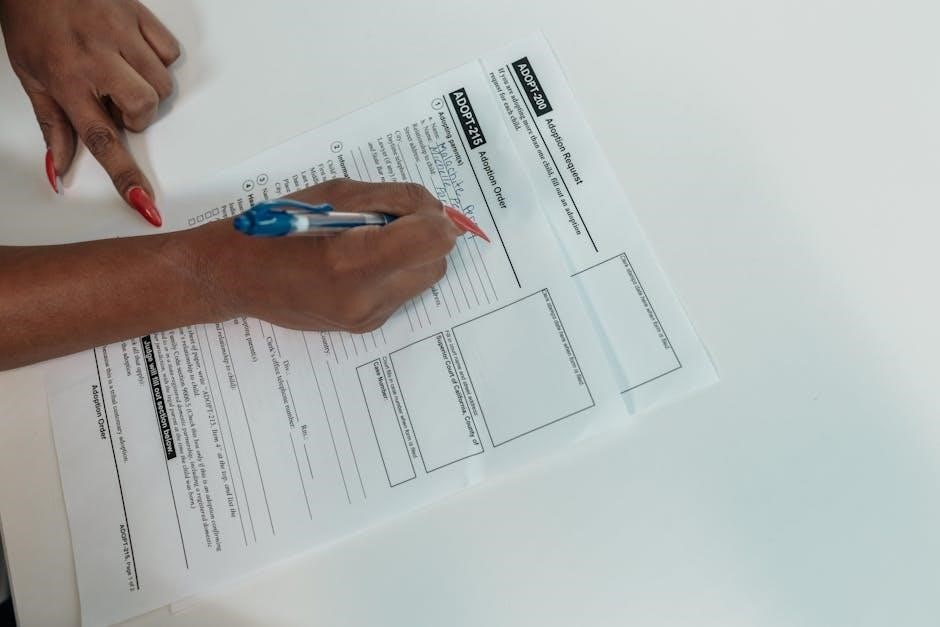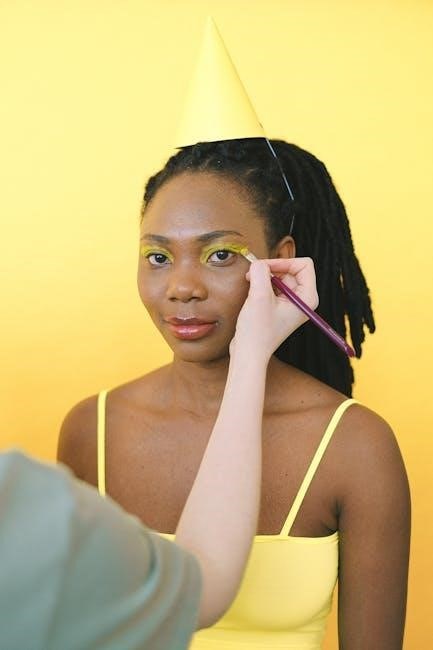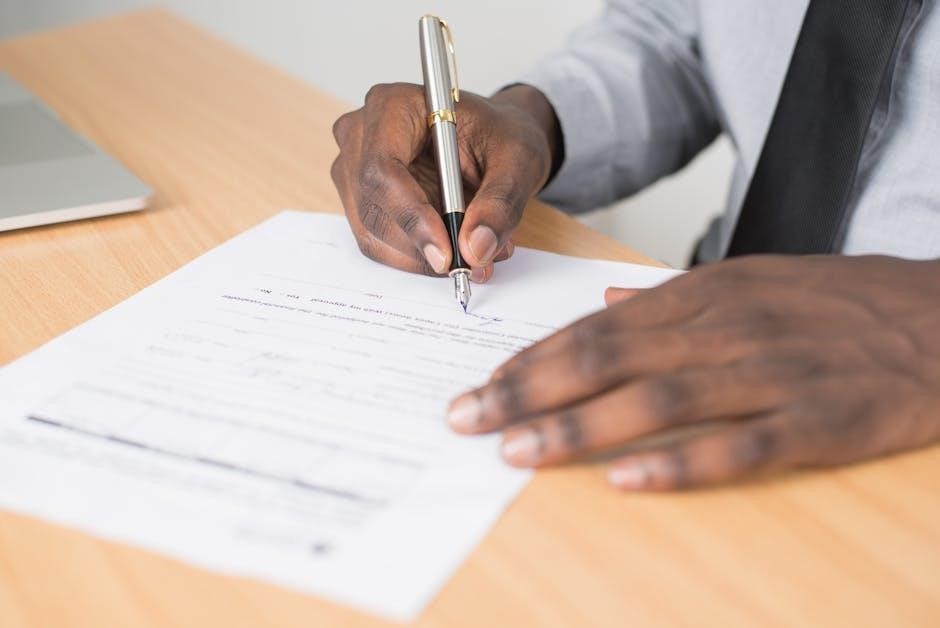nj marriage license application form
Overview of the Marriage License Application Process in New Jersey
Applicants must complete a marriage license application form, provide required documents, and meet residency requirements. A mandatory waiting period applies, and the license remains valid for 30 days.
Eligibility Criteria for Applying
Applicants must be at least 18 years old, meet residency requirements, and provide consent. Non-residents can apply where the ceremony occurs in New Jersey.
Age Requirements
Both applicants must be at least 18 years old to apply for a marriage license in New Jersey. Minors under 18 require parental or guardian consent, while those under 16 need court approval. Applicants must provide proof of age, such as a valid ID or birth certificate. Emancipated minors may apply without parental consent with proper documentation. The waiting period and license validity remain the same regardless of age. Both parties must meet these age requirements to proceed with the application.
Residency Requirements
In New Jersey, at least one applicant must be a resident of the municipality where the marriage license is applied for. Non-residents may apply in the town where the ceremony will occur. Proof of residency, such as a driver’s license or utility bill, is required. If neither applicant is a New Jersey resident, the application must be submitted in the municipality where the wedding will take place. This ensures the license is valid statewide, adhering to local regulations and procedures.
Consent Requirements
In New Jersey, both applicants must provide consent to marry, with both parties required to be at least 18 years of age. Minors under 18 cannot marry without parental or court consent. Both individuals must legally agree to the marriage, ensuring no coercion or duress. This applies to all applicants, including same-sex couples. The consent requirement is a fundamental part of the marriage license application process, ensuring both parties willingly and knowingly enter the marriage; This principle upholds the legal and ethical standards of marriage in the state.

Required Documents for Application
Applicants must provide proof of identity, proof of residency, and social security information. Additional documents may be required for special cases, such as remarriage or civil union reaffirmation.
Proof of Identity
Applicants must provide valid proof of identity when applying for a marriage license in New Jersey. Acceptable documents include a driver’s license, passport, or state/federal ID. The ID must be current and unexpired to ensure authenticity. Additional forms of identification may be accepted at the discretion of the registrar. It is crucial to verify that the chosen ID meets the state’s requirements to avoid delays in the application process. Proper identification ensures the legitimacy of the marriage license application and prevents potential issues during the ceremony or legal proceedings. Always check the expiration date beforehand to confirm validity.
Proof of Residency
Applicants must provide proof of residency when applying for a marriage license in New Jersey. Acceptable documents include a valid driver’s license, utility bills, bank statements, or lease agreements. These documents must clearly show the applicant’s name and current address. If both applicants are non-residents, the application must be submitted in the municipality where the ceremony will take place. Ensuring accurate residency proof is crucial for a smooth application process and to avoid delays. Proper documentation confirms eligibility based on New Jersey’s residency requirements. Always verify the documents’ validity before submission.
Social Security Information
Both applicants must provide their social security information when applying for a marriage license in New Jersey. A valid social security card or proof of eligibility is required. This information is used to verify identity and ensure compliance with legal requirements. If an applicant is not eligible for a social security number, alternative documentation may be requested. Accurate social security details are essential for processing the application efficiently. Applicants should ensure their social security information matches other provided documents to avoid delays. This step is critical for finalizing the marriage license application. Proper documentation is mandatory for all applicants.

How to Obtain the Application Form
The marriage license application form can be obtained online, at the Municipal Building, or through local registrars’ offices in New Jersey municipalities where applicants reside.
Online Application Options
The marriage license application form is available online through New Jersey’s municipal websites. Applicants can download and complete the form electronically, then submit it via email or through the portal. This option streamlines the process, reducing paperwork and processing time. Many municipalities allow online submissions, though some may require printing and signing the form afterward. Online applications are accessible to both residents and non-residents planning to marry in New Jersey. However, applicants must still appear in person to finalize the submission and provide required documentation.
In-Person Application Process
Visit the Local Registrar’s office or Municipal Building to complete the marriage license application form. Both applicants must appear in person, providing proof of identity, residency, and social security information. The completed form is submitted, along with the required fee, to the Registrar. After a mandatory 72-hour waiting period, the license is issued and remains valid for 30 days. This process ensures compliance with New Jersey’s marriage license regulations and prepares couples for their ceremony statewide.
Municipal Locations for Application Pickup
Applicants can obtain the marriage license application form in person at various municipal locations, such as the Local Registrar’s office, Municipal Building, or specific township offices like Fredon Township. Many municipalities provide the form at their Clerk’s Office or Registrar’s office during business hours. Some locations, like Estell Manor or South Toms River, may have updated their processes to ensure accessibility. Applicants are encouraged to check with their local municipality for specific pickup locations and availability. This step ensures easy access to the necessary forms before submission.

Fees and Payment Methods
The fee for a marriage license in New Jersey is typically $28. Payment methods may vary by municipality, but most offices accept cash, checks, or credit cards. It’s advisable to confirm accepted payment options with the Local Registrar or municipal office in advance. Ensure the fee is paid at the time of application submission to avoid delays. This cost covers the license and related administrative processes, making it a crucial step in finalizing the application.
Application Submission Process
Submit the completed application to the Local Registrar. A 72-hour waiting period applies before the license is issued. It remains valid for 30 days.
Where to Submit the Application
In New Jersey, marriage license applications must be submitted to the Local Registrar in the municipality where at least one applicant resides. If neither applicant is a resident, the application should be filed in the town where the ceremony will take place. Applications are typically submitted in person at the Registrar’s office, though some municipalities may offer online submission options. A $28 fee is required, and a 72-hour waiting period applies before the license is issued. The license is then valid for 30 days.
When to Submit the Application
Applications for a marriage license in New Jersey must be submitted no later than 10 business days before the scheduled ceremony. Once filed, a 72-hour waiting period is required before the license can be issued. The license is then valid for 30 days from the date of issuance. Couples should plan accordingly to ensure timely processing and avoid delays. Proper timing is essential to meet all legal requirements and ensure the ceremony proceeds without issues.
Signing the Application
Both applicants must sign the marriage license application form in the presence of the Local Registrar. Signing the application is a critical step, as it confirms the accuracy of the provided information. Applicants should not sign the form before meeting with the registrar, as this is a legal requirement. Failure to sign the application properly may delay the process. Ensure all signatures are clear and legible to avoid any issues with the submission and approval of the marriage license. This step is essential for the application to be legally binding.
Waiting Period and License Validity
In New Jersey, there is a mandatory 72-hour waiting period after submitting the marriage license application before the license can be issued. Once issued, the license is valid for 30 days. Couples must ensure their ceremony takes place within this timeframe. The license is valid throughout New Jersey, allowing flexibility in choosing the ceremony location within the state. Proper planning is essential to accommodate the waiting period and ensure the license does not expire before the wedding date.
Special Cases and Considerations
Non-residents must apply in the municipality where the ceremony occurs. Same-sex marriages are legally recognized, and gender-neutral options are now available on forms to ensure inclusivity and compliance with state laws.
Non-Resident Applications
Non-residents must apply for a marriage license in the New Jersey municipality where the ceremony will take place. Both applicants must appear in person at the local registrar’s office in that municipality, even if neither resides in New Jersey. The application process for non-residents follows the same general requirements, including proof of identity, residency, and Social Security information. Once issued, the license is valid throughout New Jersey, allowing the ceremony to proceed without additional documentation.
Remarriage or Reaffirmation of Civil Union
For remarriage or reaffirmation of a civil union in New Jersey, applicants must provide proof of the end of any previous marriage or civil union, such as a divorce decree or death certificate. Both parties must meet the standard eligibility criteria, including age requirements and residency rules. The application process mirrors that of a first marriage, requiring the same documents like proof of identity and Social Security information. A waiting period applies, and the license remains valid for 30 days after issuance.
Same-Sex Marriage Applications
In New Jersey, same-sex couples have equal rights to apply for a marriage license under state law. The application process is identical to heterosexual couples, requiring the same documents, such as proof of identity, residency, and Social Security information. Recent updates ensure gender-neutral language on forms, addressing previous issues with nonbinary applicants. Municipalities have corrected forms to comply with anti-discrimination laws, ensuring inclusivity. Same-sex couples must meet the same eligibility criteria and follow the standard application process, with licenses valid for 30 days after issuance.

Recent Changes to the Application Process
New Jersey has updated its marriage license application process to ensure inclusivity and compliance with anti-discrimination laws. Municipalities previously published forms with exclusionary gender options, which were corrected following violation notices from the state attorney general. Nonbinary applicants can now apply without misgendering themselves. The state has mandated gender-neutral language on forms to align with the Law Against Discrimination. These changes ensure equal access for all couples, including same-sex and nonbinary individuals, streamlining the application process while maintaining legal requirements.

How to Complete the Application Form
To complete the marriage license application form, fill it out legibly and ensure all information is accurate. Both applicants must provide required details, including names, dates of birth, and residency information. Do not sign the form until instructed by the Local Registrar. Attach necessary documents, such as proof of identity, residency, and Social Security information. Review the form carefully to avoid errors, as corrections may delay processing. Once completed, submit the application to the appropriate municipality, ensuring compliance with submission deadlines and procedures.

Frequently Asked Questions (FAQs)
What is the minimum age to apply? Both applicants must be at least 18 years old.
What documents are required? Proof of identity, residency, and Social Security information.
Is a waiting period mandatory? Yes, a 72-hour waiting period applies after application submission.
Can same-sex couples apply? Yes, same-sex marriage is legal in New Jersey.
How long is the license valid? The license is valid for 30 days after issuance.
Can non-residents apply? Non-residents must apply in the municipality where the ceremony will occur.
What is the application fee? The fee is $28, and payment methods vary by municipality.
Obtaining a marriage license in New Jersey involves completing the application form, providing necessary documents, and adhering to residency and age requirements. The process ensures legal validity for your union. Applicants must submit their forms within the required timeframe and prepare for a mandatory waiting period. Understanding the steps and requirements beforehand simplifies the process, ensuring a smooth experience for couples preparing to marry.
No related posts.
